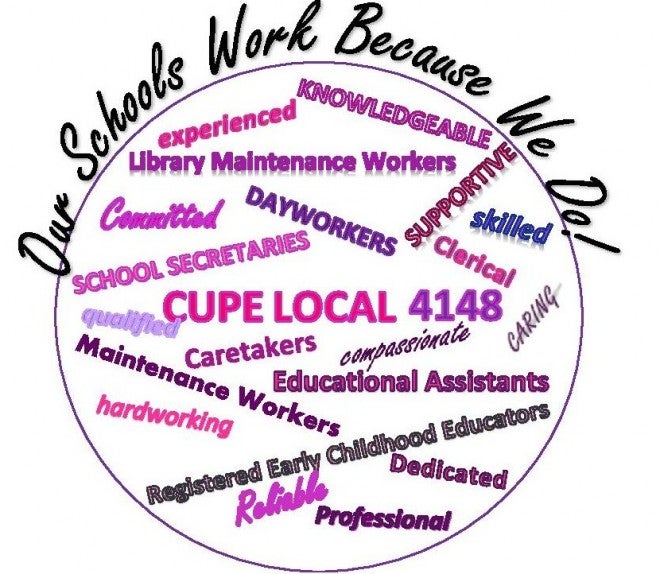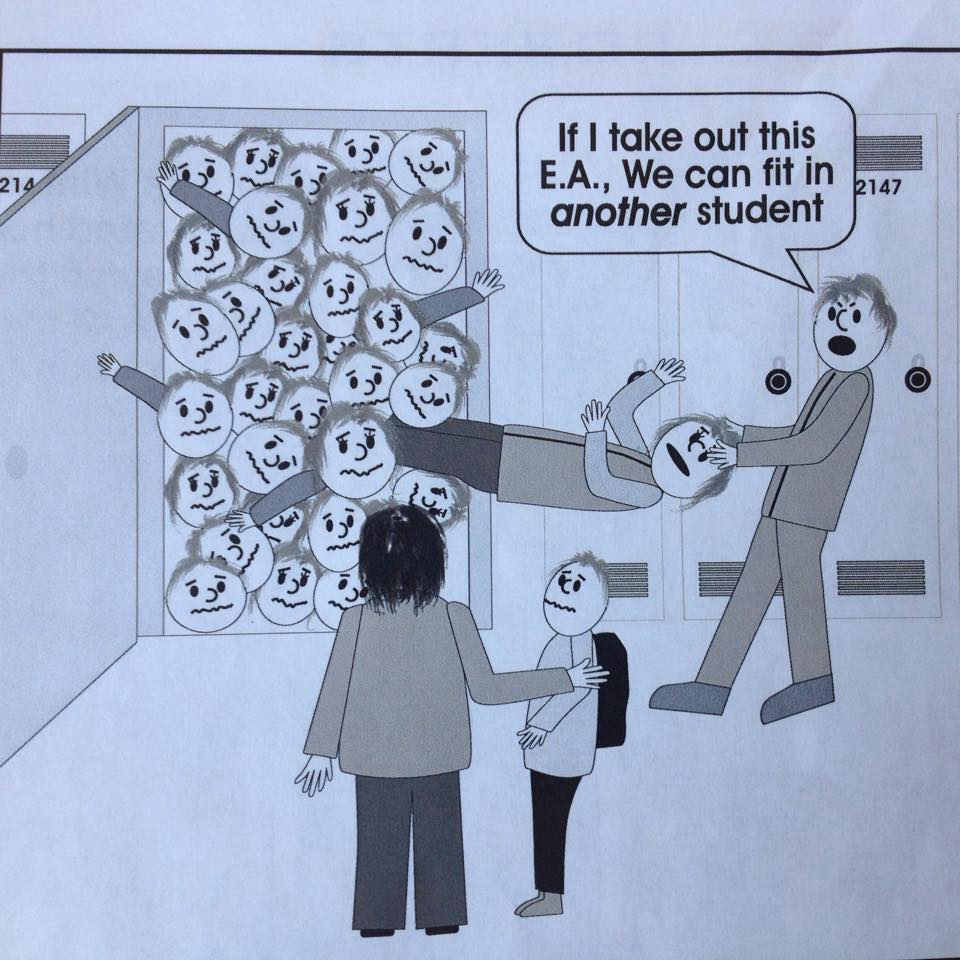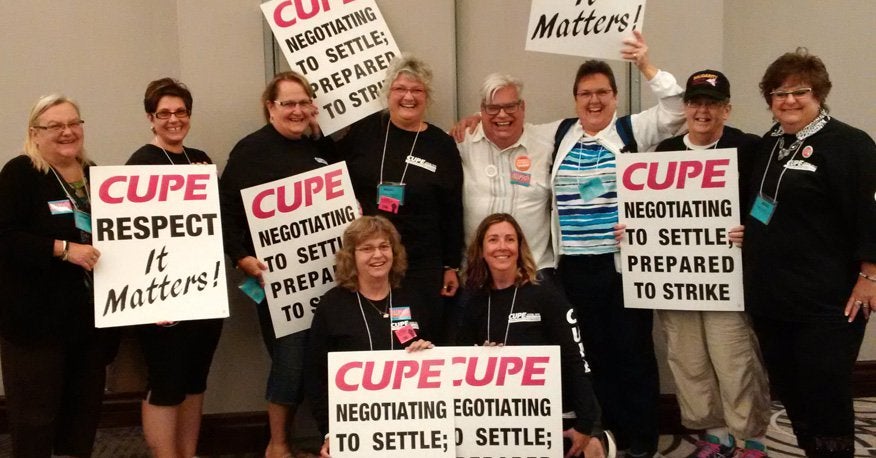September 12, 2015
Earlier this summer: A woman is waiting impatiently behind me, at our local dollar store, annoyed at how long I will take because of the many things I am obviously purchasing for my classroom. There are three other customers between us. Loudly enough for everyone to hear, she snidely teaches her daughter, “Well so what, she isn’t really paying for it. She is a teacher and she has summers off and she should be paying for it”. It stings. It isn’t remotely close to the truth. I collect my purchases and take them to my car. It is tempting to retort…but her child could be in my class next year. I am not the classroom teacher, I am the Early Childhood Educator, who works alongside the Ontario Certified Teacher, delivering the Kindergarten curriculum. Please let me tell you about my day, in light of the current CUPE school support staff job action.
Every morning I am excited to walk in to our kindergarten classroom. I put my laptop on the desk and open up the desk top, checking that all my links are in order for the lessons of the day so I can teach. There is a good chance that my teaching partner is already there and has looked up to offer me a pleasant good morning. I have just posted my freshly printed plan for the week on the bulletin board over the desk. I am excited to pull the learning materials out of my bag, which I have purchased from the dollar store, grocery store, Walmart, Staples or Ikea. I have purchased these things for them to explore because I know the environment and materials are important teachers too. Contrary to my dollar store friend’s belief, I am usually not reimbursed for any of the supplies I purchase or mention in this article.
If the students are excited, then we can develop this in to a project where I can encourage reading and writing and assess developing literacy and numeracy skills, while they also develop their observation and critical thinking skills. Maybe the project will become a discussion point for the upcoming open house evening that both my teaching partner and I will be at, or future reference for a parent-teacher interview we will both be in attendance for.
On any given day I might have carefully selected story books, or carefully cut out numbers and letters. Sometimes I bring in props to place in the dramatic play center. The children particularly enjoyed our farmers market. I brought in all sorts of fresh fall vegetables and placed them in baskets. The children made signs and went shopping, writing lists, labelling, deciding what food was healthy for them to eat. They cut out food items from weekend flyers and sorted them onto a T-graph of healthy and unhealthy food choices. We counted and figured out which column had the most selections. We talked about these choices as they chose which snacks were best for them to eat from their lunch bags first thing in the morning.
Later in the morning, we gathered on the carpet and read the story “Stone Soup”. The next day we told the story again but this time we used my Halloween cauldron and take turns putting some of the fruits and vegetables in it to make our own stone soup. The next week the children have the opportunity to retell the story with the story box I have created, complete with miniature figures and pictures for sequencing. Somebody comes over with a paper folded in half and asks me if they can make a book. I look at the paper and I walk over to my teaching partner. I show her that the child has painstakingly sounded out and written the word “k-a-r-i-t”, with a little orange crayon scribble next to it. It’s a beginning—they are only perhaps 3 and 4 years old after all and it is only September. I am so excited! I love the light coming out of her eyes. She knows she is learning, growing and she is proud! I reach up and grab the curriculum assessment checklist that my teaching partner has meticulously prepared and dutifully check it off and determine whether or not the child has satisfied the curriculum task in a developmentally appropriate manner.
This is what I live for when I go to school every day. This is what I love to do as an educator in the classroom, an early childhood specialist. I work alongside the Ontario Certified Teacher (OCT), co-delivering and assessing the curriculum for each and every child entrusted to us. I love this part of my job. I have almost 30 years’ experience working with children under the age of 12, most specifically with children 6 and under. I have a Bachelor’s Degree in Psychology, my Early Childhood Education Diploma (with Honours), and a post graduate degree in counselling, with training in art and play therapy. Many ECEs also have significant education beyond their diplomas. All are specialists trained to understand the developmental stages of a child and their learning requirements. During our two year training, we spend several of those months immersing ourselves in various child learning environments. There isn’t anything wrong with being an assistant or a helper but we were hired and explicitly told that we are co-educators, not assistants for the FDK program in Ontario classrooms.
I truly enjoy the work I am privileged to do. There is unlimited opportunity for creativity and growth within the FDK classroom. I struggle sometimes, there is a huge learning curve for me. The OCTs are often new to this type of less structured, experiential classroom but adept at administering provincially designed curriculum and knows all the professional lingo. The OCT I work with has been teaching for about ten years and has dozens of years of public education culture behind her and a well-established teacher’s union to refer to. I have had it explained to me that everyone needs to be adaptive and flexible because “they” weren’t expecting “us”. “They” didn’t sign on for “us”. I have been told that in teacher’s college, the teacher imagines herself as the Queen of her classroom. Many have said that we need to understand how difficult this is for them. I understand this. ECEs are used to sharing and are of the most flexible and adaptive people I know.
Screech….wait a minute…”they” didn’t plan on “me” but ECEs have a perspective also. It isn’t easy being the “new kid on the block”. We are told by the Province that ECEs and OCTs are equal in every way except that the OCTs have the legal responsibility of ensuring the curriculum has been delivered, that they take responsibility for by signing the report cards and Ontario Student Records. This is a critical and important difference but I am also expected to deliver the curriculum and contribute to the information on the report cards. I am one of the more fortunate ECEs in the province. Our school board is considered one of the top employers. I am at the highest level of my pay grid. I make $26/hr, 35 hours per week, 10 months of the year. That amounts to approximately $39,600 per year. I am considered “laid off” during the summer. I come back during the last week of summer, excited to set the classroom up with my teaching partner, even though no 10 month employee is paid for this time. I have been told by senior managers that many teachers make at least two, and sometimes almost three times what we make.
ECEs are not less educated than OCTs in terms of educating children. We have two year teaching diplomas and they have one year of teacher’s college (now moved to a two year study program). Yes, all OCTs have undergraduate degrees, but they are not necessarily relevant to teaching and many were done concurrently with teacher’s college. In my case, I have an undergraduate degree as well—and then some. Others do as well. I am thankful that my teaching partner does not think I am there to merely wash out paint pots and spot them for their lunch break. Many OCTs do treat their ECE colleagues in this manner. I work very, very hard. Most teaching professionals do but we receive less respect, work in less safe environments, for longer classroom hours and less pay. It has been a challenge, sometimes daily, to function as a respected educator.
I am expected to develop plans and implement curriculum, document and assess learning and communicate with parents but it is an ongoing struggle to negotiate even what in fact a given teacher/school/board will allow you to do in the classroom with the children. It is not supposed to be hierarchical but it often becomes that way. We are not always trusted as educators by our new colleagues. I know it takes time. It can be hard negotiating the structure of the day with someone who isn’t always ready to share aspects of the day they are used to managing. I do not start our morning lesson/routine. My teaching partner recently shared that she gets pure joy from starting our day with the children and delivering the first morning lesson, setting the tone for the day. I am glad she is passionate about teaching. So am I. I am trying to expand my knowledge and develop better classroom management skills so that perhaps she will have more confidence in my ability to lead this part of our day. She is gifted at this and a joy to watch. She regularly acknowledges and appreciates many of the things I do. I believe we have much we can learn from each other and I know that sometimes I need to have thicker skin than what I have as we negotiate through these speed bumps.
I am truly not trying to be divisive but the system is inherently divisive. I am expected to implement state-of-the-art curriculum but I would barely be able to independently support myself, let alone any of my four children and two step children if I were not married to my husband. I have no prep time to plan and put together the ideas and materials for this curriculum at school. ALL of it is done on my own time. As a matter of fact, this gives ECEs the majority of the classroom time with the children. Our lunches are shorter than our OCT colleagues and squeezed into the day in such a manner to ensure that OCT isn’t in violation of any OECTA parameters. One year my, unpaid lunch break was scheduled at 10 am. I am not there for lunch though. I love educating. We have none of our own planning time and very little planning time with our school or classroom teachers. There is virtually no potential for career advancement.
Oh, that laptop I mentioned at the beginning—it is my personal laptop from home. The OCTs are assigned theirs by the Board. I bring mine in to help me with the lunch time transition that I manage independently while my partner has lunch during the scheduled OCT lunch break (I currently have approximately 650 supervisory, non-instructional minutes during the school week. That is 10 hours and 50 minutes! Some would like to say they are not duty minutes and we can find in them what are called “teachable moments” but that isn’t how an OCT would consider this, but back to my day). I bring in the children in from outdoor recess and try to streamline them (not exactly with military precision) as they learn to zip/unzip coats, change their shoes, find their lunches, wash their hands, go to the washroom, locate their mats and blankets, wash the tables an sweep the floors. I am lucky. There are only 25 children this year. Last year there were thirty. This year, no one has yet been assessed and diagnosed with autism. This means I am alone, without an OCT or EA support either. There are several behavioral question marks in the class but it is only September and some children have never had to put their own shoes on before. I pray no one has a toileting mishap today. I pray there are not too many exploded yogurts and pudding cups in lunch bags they have yet to master. By the time these transitions are over, I am happy to start the relaxation music and start “quiet time” and take a deep breath. It has been 60 minutes of intense transition. It is only September, hopefully October will be easier.
I realize September is an intense month for parents, children and schools alike. Especially in Kindergarten. On September 10th, 55,000 CUPE employees started job action. During work-to-rule some of these challenges I have mentioned are naturally highlighted. My union is trying to negotiate but there are few dates scheduled. Management apparently has the right to place limitations on work-to-rule efforts if it can be deemed to be in the “safest interests of the children”. Sometimes this means that during work to rule, the status quo can be maintained. I want to believe Principals when they say they would like to assign ECEs less supervision duty but my collective agreement (unlike OCTs) has no limits and they have no one else. I want to have safe classrooms and playgrounds for the children, but rooms are overcrowded and support staff have taken the role of crowd control supervisors.
At the end of the day, I bring many of the exhausted little cherubs to their expectant parents. I know they think I have assisted the OCT today as their helper. I know many parents will bypass me and talk to the OCT about the child’s learning. I hear someone say, “Hey were you at the dollar store last night?” Every now and then, a thoughtful parent will take the time to acknowledge that I have made a specific difference in their child’s life and I am recharged and refocused. In a child’s 6.5 hour day at school, I am with them 5.5 hours – engaging, documenting, planning, assessing and will do it all again tomorrow because I AM AN EDUCATOR.
Sincerely,
Kerry Scott,
RECE
CUPE 2357







